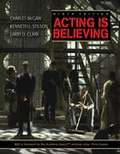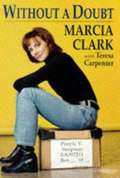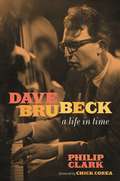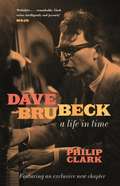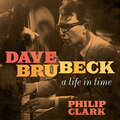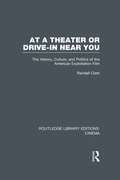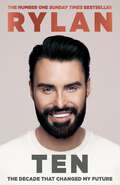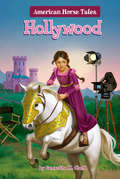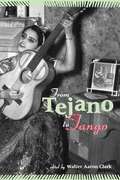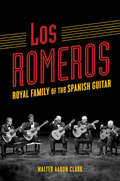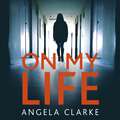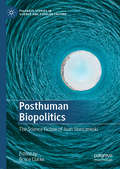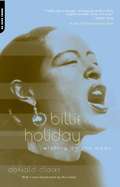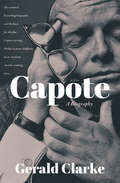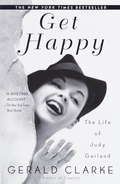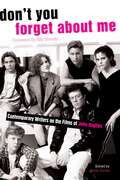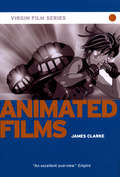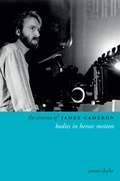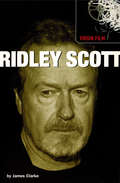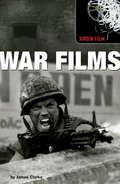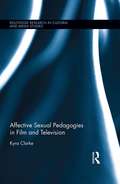- Table View
- List View
Acting Is Believing
by Larry D. Clark Kenneth L. Stilson Charles McgawIn this text, McGaw (Art Institute of Chicago School of Drama, deceased), Stilson (theater and dance, Southeast Missouri State U.) and Clark (dean emeritus, College of Arts and Sciences, U. of Missouri, Columbia) bring the traditional methods of Stanislavski in line with more contemporary schools, such as the Sanford Meisner approach.
Without a Doubt
by Marcia Clark Teresa CarpenterAs the prosecutor in the OJ Simpson trial, this book is about how Marcia Clark orchestrated the most controversial case of her career.
Dave Brubeck: A Life in Time
by Philip ClarkThe definitive, investigative biography of jazz legend Dave Brubeck ("Take Five")In 2003, music journalist Philip Clark was granted unparalleled access to jazz legend Dave Brubeck. Over the course of ten days, he shadowed the Dave Brubeck Quartet during their extended British tour, recording an epic interview with the bandleader. Brubeck opened up as never before, disclosing his unique approach to jazz; the heady days of his "classic" quartet in the 1950s-60s; hanging out with Duke Ellington, Charlie Parker, Louis Armstrong, and Miles Davis; and the many controversies that had dogged his 66-year-long career. Alongside beloved figures like Ella Fitzgerald and Frank Sinatra, Brubeck's music has achieved name recognition beyond jazz. But finding a convincing fit for Brubeck's legacy, one that reconciles his mass popularity with his advanced musical technique, has proved largely elusive. In Dave Brubeck: A Life in Time, Clark provides us with a thoughtful, thorough, and long-overdue biography of an extraordinary man whose influence continues to inform and inspire musicians today. Structured around Clark's extended interview and intensive new research, this book tells one of the last untold stories of jazz, unearthing the secret history of "Take Five" and many hitherto unknown aspects of Brubeck's early career - and about his creative relationship with his star saxophonist Paul Desmond. Woven throughout are cameo appearances from a host of unlikely figures from Sting, Ray Manzarek of The Doors, and Keith Emerson, to John Cage, Leonard Bernstein, Harry Partch, and Edgard Varèse. Each chapter explores a different theme or aspect of Brubeck's life and music, illuminating the core of his artistry and genius. To quote President Obama, as he awarded the musician with a Kennedy Center Honor: "You can't understand America without understanding jazz, and you can't understand jazz without understanding Dave Brubeck."
Dave Brubeck: A Life In Time
by Philip ClarkWINNER OF THE PRESTO JAZZ BOOK OF THE YEAR 2020An articulate, scrupulously researched account based on first-hand information, this book presents Brubeck's contribution to music with the critical insight that it deserves - ***** BBC Music Magazine This is the writing about jazz that we've been waiting for - Mike WestbrookThe sheer descriptive verve, page after page, made me want to listen to every single musical example cited. A major achievement - Stephen Hough'Definitive . . . remarkable. Clark writes intelligently and joyously.' - MojoIn 2003, music journalist Philip Clark was granted unparalleled access to jazz legend Dave Brubeck. Over the course of ten days, he shadowed the Dave Brubeck Quartet during their extended British tour, recording an epic interview with the bandleader. Brubeck opened up as never before, disclosing his unique approach to jazz; the heady days of his 'classic' quartet in the 1950s-60s; hanging out with Duke Ellington, Charlie Parker, Louis Armstrong, and Miles Davis; and the many controversies that had dogged his 66-year-long career.Alongside beloved figures like Ella Fitzgerald and Frank Sinatra, Brubeck's music has achieved name recognition beyond jazz. But finding a convincing fit for Brubeck's legacy, one that reconciles his mass popularity with his advanced musical technique, has proved largely elusive. In Dave Brubeck: A Life in Time, Clark provides us with a thoughtful, thorough, and long-overdue biography of an extraordinary man whose influence continues to inform and inspire musicians today.Structured around Clark's extended interview and intensive new research, this book tells one of the last untold stories of jazz, unearthing the secret history of 'Take Five' and many hitherto unknown aspects of Brubeck's early career - and about his creative relationship with his star saxophonist Paul Desmond. Woven throughout are cameo appearances from a host of unlikely figures from Sting, Ray Manzarek of The Doors, and Keith Emerson, to John Cage, Leonard Bernstein, Harry Partch, and Edgard Varèse. Each chapter explores a different theme or aspect of Brubeck's life and music, illuminating the core of his artistry and genius.
Dave Brubeck: A Life in Time
by Philip ClarkThe definitive, investigative biography of jazz legend Dave Brubeck.In 2003, music journalist Philip Clark was granted unparalleled access to jazz legend Dave Brubeck. Over the course of ten days, he shadowed the Dave Brubeck Quartet during their extended British tour, recording an epic interview with the bandleader. Brubeck opened up as never before, disclosing his unique approach to jazz; the heady days of his 'classic' quartet in the 1950s-60s; hanging out with Duke Ellington, Charlie Parker, Louis Armstrong, and Miles Davis; and the many controversies that had dogged his 66-year-long career.Alongside beloved figures like Ella Fitzgerald and Frank Sinatra, Brubeck's music has achieved name recognition beyond jazz. But finding a convincing fit for Brubeck's legacy, one that reconciles his mass popularity with his advanced musical technique, has proved largely elusive. In Dave Brubeck: A Life in Time, Clark provides us with a thoughtful, thorough, and long-overdue biography of an extraordinary man whose influence continues to inform and inspire musicians today.Structured around Clark's extended interview and intensive new research, this book tells one of the last untold stories of jazz, unearthing the secret history of 'Take Five' and many hitherto unknown aspects of Brubeck's early career - and about his creative relationship with his star saxophonist Paul Desmond. Woven throughout are cameo appearances from a host of unlikely figures from Sting, Ray Manzarek of The Doors, and Keith Emerson, to John Cage, Leonard Bernstein, Harry Partch, and Edgard Varèse. Each chapter explores a different theme or aspect of Brubeck's life and music, illuminating the core of his artistry and genius.(P) 2020 Hachette Audio
At a Theater or Drive-in Near You: The History, Culture, and Politics of the American Exploitation Film (Routledge Library Editions: Cinema)
by Randall ClarkMillions of Americans have been thrilled, scared, titillated, and shocked by exploitation movies, low budget films with many scenes of sex, violence, and other potentially lurid elements. The term derives from the fact that promoters of such films exploit the contents in advertising that plays up the sexual or violent aspects of the films. This is the first comprehensive study of the American exploitation film to be published. It discusses five distinct genres: the teen movie, the sexploitation film, the martial arts movie, the blaxploitation film and the lawbreaker picture. Contained within these genres are many popular American film types, including beach movies, biker pictures, and women's prison movies. The study provides a history and sociopolitical analysis of each genre, focusing on significant films in those genres. It also discusses the economics of exploitation films and their place in the motion picture industry, the development of drive-in theaters, the significance of the teenage audience, and the effect of the videocassette. Finally, the book applies major film and cultural theories to establish an aesthetic for evaluating the exploitation film and to explore the relationship between film and audience.
TEN: The decade that changed my future
by Rylan ClarkPre-order the brand-new memoir from Rylan.Funny and outspoken, Rylan is one of the UK's most-loved presenters and a true household name. Rylan first emerged on our screens in September 2012 and in the ten years since then has become a one-of-a-kind national treasure. In this brand-new memoir, Rylan invites us deeper into his world to reflect on all the things he's learnt from a decade in the limelight, whilst also pulling back the curtain on his personal journey. Covering everything from fame and celebrity to his mental health and identity, family and relationships to his love of reality TV, he recounts his life lessons with humour, candour and a huge amount of heart. From the moments that have shaped him to the mistakes that have made him, and the unusual pastimes that have obsessed him along the way.With unforgettable stories about his rise to fame, his biggest regrets and his special bond with his beloved mum, TEN: The decade that changed my future is as warm and honest, enormously entertaining and full of surprises as its brilliant Sunday Times bestselling author.This is Rylan as you've never seen him before - an intimate, fascinating and joyful insight into an extraordinary ten years on the telly and in our hearts.
TEN: The decade that changed my future
by Rylan ClarkPre-order the brand-new memoir from Rylan.Funny and outspoken, Rylan is one of the UK's most-loved presenters and a true household name. Rylan first emerged on our screens in September 2012 and in the ten years since then has become a one-of-a-kind national treasure. In this brand-new memoir, Rylan invites us deeper into his world to reflect on all the things he's learnt from a decade in the limelight, whilst also pulling back the curtain on his personal journey. Covering everything from fame and celebrity to his mental health and identity, family and relationships to his love of reality TV, he recounts his life lessons with humour, candour and a huge amount of heart. From the moments that have shaped him to the mistakes that have made him, and the unusual pastimes that have obsessed him along the way.With unforgettable stories about his rise to fame, his biggest regrets and his special bond with his beloved mum, TEN: The decade that changed my future is as warm and honest, enormously entertaining and full of surprises as its brilliant Sunday Times bestselling author.This is Rylan as you've never seen him before - an intimate, fascinating and joyful insight into an extraordinary ten years on the telly and in our hearts.
Hollywood #2 (American Horse Tales #2)
by Samantha M. ClarkSet in modern-day California, this American Horse Tale is the story of a young girl who, along with her family's horse, is destined for the big screen.Juniper is a young girl who dreams of making it big in the movies along with her horse, Able. In particular, Juniper is obsessed with getting Able onto her favorite television show, Castle MacAvoy, and will do anything, even slay dragons, to make that happen. Hollywood is part of a series of books written by several authors highlighting the unique relationships between young girls and their horses.
From Tejano to Tango: Latin American Popular Music
by Walter ClarkArticles on how music influences politics and identity in Argentina and Nicaragua, locality in North America and Cuba, and globalization and mass media in Brazil and Peru.
Los Romeros: Royal Family of the Spanish Guitar (Music in American Life)
by Walter Aaron ClarkSpanish émigré guitarist Celedonio Romero gave his American debut performance on a June evening in 1958. In the sixty years since, the Romero Family—Celedonio, his wife Angelita, sons Celín, Pepe, and Angel, as well as grandsons Celino and Lito—have become preeminent in the world of Spanish flamenco and classical guitar in the United States. Walter Aaron Clark's in-depth research and unprecedented access to his subjects have produced the consummate biography of the Romero family. Clark examines the full story of their genius for making music, from their outsider's struggle to gain respect for the Spanish guitar to the ins and outs of making a living as musicians. As he shows, their concerts and recordings, behind-the-scenes musical careers, and teaching have reshaped their instrument's very history. At the same time, the Romeros have organized festivals and encouraged leading composers to write works for guitar as part of a tireless, lifelong effort to promote the guitar and expand its repertoire. Entertaining and intimate, Los Romeros opens up the personal world and unfettered artistry of one family and its tremendous influence on American musical culture.
On My Life: the gripping fast-paced thriller with a killer twist
by Angela ClarkeWhen a pregnant woman is imprisoned on suspicion of murder, she must fight to prove her innocence from behind bars or her baby may be given away to whoever framed her...Framed. Imprisoned. Pregnant. It's her worst nightmare...Jenna Burns thought she had the perfect life: a loving fiancé, a great job, a beautiful home. Then she returns home one day to find her stepdaughter murdered; her partner missing.And the police think it was her...Jenna knows she's been framed. But how can she prove it from behind bars? And then she finds out she is pregnant. It's not only her life at stake. Surrounded by prisoners who'd hurt her if they knew what she's accused of; aware that someone outside hates her enough to kill; Jenna will do whatever it takes to clear her name, save her baby, and find out the truth. But can she do it in time? (P)2019 Hodder & Stoughton Limited
Posthuman Biopolitics: The Science Fiction of Joan Slonczewski (Palgrave Studies in Science and Popular Culture)
by Bruce ClarkeThis volume presents the first collection of essays dedicated to the science fiction of microbiologist Joan Slonczewski. Posthuman Biopolitics consolidates the scholarly literature on Slonczewski’s fiction and demonstrates fruitful lines of engagement for the critical, cultural, and theoretical treatment of her characters, plots, and storyworlds. Her novels treat feminism in relation to scientific practice, resistance to domination, pacifism versus militarism, the extension of human rights to nonhuman and posthuman actors, biopolitics and posthuman ethics, and symbiosis and communication across planetary scales. Posthuman Biopolitics explores the breadth and depth of Joan Slonczewski’s vision, uncovering the reflective ethical practice that informs her science fiction.
Billie Holiday: Wishing on the Moon
by Donald ClarkeCertainly no singer has been more mythologized and more misunderstood than Billie Holiday, who helped to create much of the mystique herself with her autobiography, Lady Sings the Blues. "Now, finally, we have a definitive biography," said Booklist of Donald Clarke's Billie Holiday, "by a deeply compassionate, respectful, and open-minded biographer [whose] portrait embraces every facet of Holiday's paradoxical nature, from her fierceness to her vulnerability, her childlikeness to her innate elegance and amazing strength. " Clarke was given unrivaled access to a treasure trove of interviews from the 1970s-interviews with those who knew Lady Day from her childhood in the streets and good-time houses of Baltimore through the early days of success in New York and into the years of fame, right up to her tragic decline and death at the age of forty-four. Clarke uses these interviews to separate fact from fiction and, in the words of the Seattle Times, "finally sets us straight. . . evoking her world in all its anguish, triumph, force and irony. " Newsday called this "a thoroughly riveting account of Holiday and her milieu. " The New York Times raved that it "may be the most thoroughly valuable of the many books on Holiday," and Helen Oakley Dance in JazzTimes said, "We should probably have to wait a long time for another life of Billie Holiday to supersede Donald Clarke's achievement. "
Capote: A Biography (Books Into Film Ser.)
by Gerald ClarkeThe national bestselling biography and the basis for the film Capote starring Philip Seymour Hoffman in an Academy Award–winning turn. One of the strongest fiction writers of his generation, Truman Capote became a literary star while still in his teens. His most phenomenal successes include Breakfast at Tiffany&’s, In Cold Blood, and Other Voices, Other Rooms. Even while his literary achievements were setting the standards that other fiction and nonfiction writers would follow for generations, Capote descended into a spiral of self-destruction and despair. This biography by Gerald Clarke was first published in 1988—just four years after Capote&’s death. In it, Clarke paints a vivid behind-the-scenes picture of the author&’s life—based on hundreds of hours of in-depth interviews with the man himself and the people close to him. From the glittering heights of notoriety and parties with the rich and famous to his later struggles with addiction, Capote emerges as a richly multidimensional person—both brilliant and flawed. &“A book of extraordinary substance, a study rich in intelligence and compassion . . . To read Capote is to have the sense that someone has put together all the important pieces of this consummate artist&’s life, has given everything its due emphasis, and comprehended its ultimate meaning.&” —Bruce Bawer, The Wall Street Journal &“Mesmerising . . . [Capote] reads as if it had been written alongside his life, rather than after it.&” —Molly Haskell, The New York Times Book Review
Get Happy: The Life of Judy Garland (Americana Ser.)
by Gerald ClarkeJudy Garland. The girl with the pigtails, the symbol of innocence in The Wizard of Oz. Judy Garland. The brightest star of the Hollywood musical and an entertainer of almost magical power. Judy Garland. The woman of a half-dozen comebacks, a hundred heartbreaks, and countless thousands of headlines. Yet much of what has previously been written about her is either inaccurate or incomplete, and the Garland the world thought it knew was merely a sketch for the astonishing woman Gerald Clarke portrays in Get Happy. Here, more than thirty years after her death, is the real Judy. To tell her story, Clarke took ten years, traveled thousands of miles across two continents, conducted hundreds of interviews, and dug through mountains of documents, many of which were unavailable to other biographers. In a Tennessee courthouse, he came across a thick packet of papers, unopened for ninety years, that laid out the previously hidden background of Judy's beloved father, Frank Gumm. In California, he found the unpublished memoir of Judy's makeup woman and closest confidante, a memoir centered almost entirely on Judy herself. Get Happy is, however, more than the story of one woman, remarkable as she was. It is a saga of a time and a place that now seem as far away, and as clouded in myth and mystery, as Camelot-the golden age of Hollywood. Combining a novelist's skill and a movie director's eye, Clarke re-creates that era with cinematic urgency, bringing to vivid life the unforgettable characters who played leading roles in the unending drama of Judy Garland: Louis B. Mayer, the patriarch of the world's greatest fantasy factory, Metro-Goldwyn-Mayer. Arthur Freed, the slovenly producer who revolutionized the movie musical and gave Judy her best and most enduring parts. Sexy Lana Turner, Judy's friend and idol, who had a habit of trying to snatch away any man Judy expressed interest in. And what men they were! Oscar Levant, the wit's wit, whose one-liners could all but kill. Artie Shaw, whose sweet and satiny clarinet had a whole nation dancing. Handsome Tyrone Power, who caused millions of hearts to pound every time he looked out from the screen with his understanding eyes. Orson Welles, Hollywood's boy genius and the husband of a movie goddess, Rita Hayworth. Brainy Joe Mankiewicz, who knew everything there was to know about women, but who confessed that he was baffled by Judy. Vincente Minnelli, who showed what wonders Judy could perform in front of a camera and who fathered her first child, Liza-but who also, with an act of shocking betrayal, caused her first suicide attempt. Charming, brawling Sid Luft, who gave her confidence, then took it away. And the smooth and seductive David Begelman, who stole her heart so he could steal her money. Toward the end of her life, Garland tried to tell her own story, talking into a tape recorder for hours at a time. With access to those recordings-and to her unfinished manuscript, which offers a revelation on almost every page-Clarke is able to tell Judy's story as she herself might have told it. "It's going to be one hell of a great, everlastingly great book, with humor, tears, fun, emotion and love," Judy promised of the autobiography she did not live to complete. But she might just as well have been describing Get Happy. For here at last--told with humor, tears, fun, emotion and love--is the true, unforgettable story of Judy Garland.
Don't You Forget About Me: Contemporary Writers on the Films of John Hughes
by Jaime ClarkeNo one captured the teen portion of the eighties as poignantly as writer-director John Hughes. Sixteen Candles, The Breakfast Club, Weird Science, Pretty in Pink, Ferris Bueller's Day Off, and Some Kind of Wonderful are timeless tales of love, angst, longing, and self-discovery that illuminated and assuaged the anxieties of an entire generation. Fondly nostalgic, filled with wit and surprising insights, don't you forget about me contains original essays from a skillfully chosen crop of novelists and essayists on the films' far-reaching effects on their own lives -- an irresistible read for anyone who came of age in the eighties (or just wishes they did). Featuring new writing from: Steve Almond * Julianna Baggott * Lisa Borders * Ryan Boudinot * T Cooper * Quinn Dalton * Emily Franklin * Lisa Gabriele * Tod Goldberg * Nina de Gramont * Tara Ison * Allison Lynn * John McNally * Dan Pope * Lewis Robinson * Ben Schrank * Elizabeth Searle * Mary Sullivan * Rebecca Wolff * Moon Unit Zappa
Animated Films - Virgin Film
by James ClarkeAnimation has never been so popular. The best animated films have combined the latest technology with creativity and a flair for storytelling and are adored by both children and adults. With films such as Monsters, Inc., Shrek and Toy Story capturing the imagination of moviegoers and critics, animated film is enjoying a resurgence unseen since its golden age in the 30s and 40s. From the earliest full-length feature animation, Disney's Snow White and the Seven Dwarfs, through stop-motion animation and Japanese anime to the advent of CGI, this book takes a critical look at animation through the ages and explores its infinite cinematic possibilities.
The Cinema of James Cameron: Bodies in Heroic Motion (Directors' Cuts)
by James ClarkeThis timely volume explores the massively popular cinema of writer-director James Cameron. It couches Cameron's films within the evolving generic traditions of science fiction, melodrama, and the cinema of spectacle. The book also considers Cameron's engagement with the aesthetic of visual effects and the 'now' technology of performance-capture which is arguably moving a certain kind of event-movie cinema from photography to something more akin to painting. This book is explicit in presenting Cameron as an authentic auteur, and each chapter is dedicated to a single film in his body of work, from The Terminator to Avatar. Space is also given to discussion of Strange Days as well as his short films and documentary works.
The Cinema of James Cameron
by James ClarkeThis timely volume explores the massively popular cinema of writer-director James Cameron. It couches Cameron's films within the evolving generic traditions of science fiction, melodrama, and the cinema of spectacle. The book also considers Cameron's engagement with the aesthetic of visual effects and the 'now' technology of performance-capture which is arguably moving a certain kind of event-movie cinema from photography to something more akin to painting. This book is explicit in presenting Cameron as an authentic auteur, and each chapter is dedicated to a single film in his body of work. Space is also given to discussion of Strange Days as well as his documentary works.
The Cinema of James Cameron
by James ClarkeThis timely volume explores the massively popular cinema of writer-director James Cameron. It couches Cameron's films within the evolving generic traditions of science fiction, melodrama, and the cinema of spectacle. The book also considers Cameron's engagement with the aesthetic of visual effects and the 'now' technology of performance-capture which is arguably moving a certain kind of event-movie cinema from photography to something more akin to painting. This book is explicit in presenting Cameron as an authentic auteur, and each chapter is dedicated to a single film in his body of work. Space is also given to discussion of Strange Days as well as his documentary works.
Virgin Film: Ridley Scott
by James ClarkeThis indispensable guide provides a thorough chronological examination of Ridley Scott's directorial career. All of Scott's films are included, along with information on his frequent collaborators, his thoughts on his own films, and a section on his unrealised projects. This is the essential reference guide to one of mainstream cinema's most diverse directors.
Virgin Film: War Films
by James ClarkeWar films have existed since the birth of cinema, typically gung-ho tales of macho derring-do. But war films are not always about bravado and bravery, they also detail the horrors of war, the sadness, the brotherhood of soldiers and comedy that can be found in the bleakest of situations, as well as the excitement of the battlefield. War Films explores defining movies of the genre in sections covering different wars as well as wars with other worlds.The book also offers links between the different films, historical and cinematic worth and profiles of key actors and directors. Among the films included are Saving Private Ryan, Dr Strangelove,Welcometo Sarajevo, The Dam Busters, Gallipoli, The Deer Hunter and Ran.
Willow the Duckling (Dr. KittyCat #4)
by Jane ClarkeFeathers will fly if this feline vet can’t cure a baby duck’s stage fright in this delightful adventure from the author of Daisy the Kitten.We’ll be there in a whisker! Dr. KittyCat is a talented vet—and an adorable cat. She’s ready to rescue whenever help is needed.All the little animals of Thistletown are putting on a show. Dr. KittyCat is on hand to make sure everyone stays safe. When Willow the duckling feels sick just before she’s supposed to go on stage, she’s worried she’ll miss her big moment. Dr. KittyCat must get quacking and figure out what’s wrong!Willow has two-color art inside! Supercute photographs of real animals combine with hand-drawn orange line art for a completely unique look.Praise for Posy the Puppy“Beatrix Potter meets Grey’s Anatomy as a feline medic tends to animals’ scraped ears, hurt ankles, and other bumps and bruises in this series opener.” —Publishers Weekly“Cuddly animals everywhere are lucky to have Dr. KittyCat on call.” —Kirkus Reviews
Affective Sexual Pedagogies in Film and Television (Routledge Research in Cultural and Media Studies)
by Kyra ClarkePopular film and television hold valuable potential for learning about sex and sexuality beyond the information-based model of sex education currently in schools. This book argues that the representation of complicated—or "messy"—relationships in these popular cultural forms makes them potent as affective pedagogical moments. It endeavours to develop new sexual literacies by contemplating how pedagogical moments, that is, fleeting moments which disrupt expectations or create discomfort, might enrich the available discourses of sexuality and gender, especially those available to adolescents. In Part One, Clarke critiques the heteronormative discourses of sex education that produce youth in particularly gendered ways, noting that "rationality" is often expected to govern experiences that are embodied and arguably inherently incoherent. Part Two explores public intimacy, contemplating the often overlapping and confused boundaries between public and private.
